The Maine Intellectual Commons
The Maine Intellectual Commons
The Maine Intellectual Commons
The Maine Intellectual Commons
Establishing New Standards for Scholarly and Creative Access
Welcome
The
Maine Intellectual Commons is a project of the
University of Maine, a national leader in promoting open access to scholarly and creative work. Participants in the
Maine Intellectual Commons have established forward-looking copyright policies, proposed new open license terms, and organized important events promoting a commons approach to intellectual property.
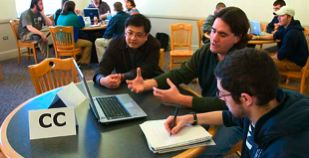
Find out more about its past achievements and current work in progress by choosing a link at left.
ABOVE: Open license workshops from the Conference on the Intellectual Commons. Photo by Bill Kuykendall.
Sponsored by the
University
of Maine Information Science Collaborative,
Fogler
Library,
Technology
Law Center of the University of Maine School of Law,
Still
Water and other organizations concerned with preserving and
expanding access to digital information.
The price of academic journals is increasing so fast that they will soon be out of reach for all but the wealthiest universities, and scholarly access to digital materials can be restricted by new forms of technological control. Open access journals and repositories offer researchers more options than traditional periodicals and commercial middlemen. But how can faculty satisfy tenure expectations to publish in prestigious journals and yet foster the open circulation of ideas essential to academia?
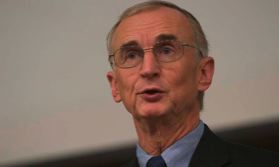
The
Maine Intellectual Commons tackles this issue by asking whether the criteria for tenure need to change to accommodate the changing legal and economic climate of intellectual property and the increasing diversity of electronic means of scholarly access. For more on the working group addressing this question, click on
Work in Progress > Incentives at left.
For more background on the problem and its solutions, see the archived presentations by Hal Abelson, Marilyn Lutz, Jean-Claude Guedon, and Peter Suber from The University of Maine's November 2004
Conference on the Intellectual Commons.
ABOVE: University President Robert Kennedy addresses the predicament of today's scholars at the Conference on the Intellectual Commons. Photo by Bill Kuykendall.
Digital tools allow creators unprecedented power to sample and remix art, music, text, and video. Yet the record labels are suing thousands of college students every year, Hollywood has followed suit, and Congress is considering outlawing peer-to-peer networks and other technologies for distributing and accessing culture. Can innovation and intellectual property co-exist in the Internet age?
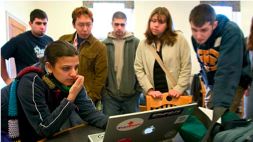
The open licenses promulgated by
Creative Commons offer one solution to this problem. Click on
Work in Progress > Open Licenses at left to learn more about how the University of Maine community is working with Creative Commons and others to craft a special license for stimulating digital creativity.
For more background on the problem and its solutions, see the
background link at left or view the archived presentations by Joline Blais, Neeru Paharia, Dylan Suzanne, and Tim Whidden from The University of Maine's November 2004
Conference on the Intellectual Commons.
ABOVE: Neeru Paharia of Creative Commons shows students how to apply open licenses at the Conference on the Intellectual Commons. Photo by Bill Kuykendall.
Companies like IBM and Novell, along with governments from Brazil to Korea, have embraced "open source" software development. Authors like Cory Doctorow have spurred book sales by distributing free online copies. High profile firms like Google and Red Hat Linux stay profitable even though their basic product is free. How does open access provide these businesses with a competitive advantage?
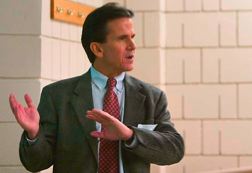
Click on
Work in Progress > Educating the Community at left to learn more about how the University of Maine community is working to raise consciousness about business models that promote or exploit the benefits of digital access.
For more background on the problem and its solutions, see the archived presentation by Jim Campbell and Ted Coladarci from The University of Maine's November 2004
Conference on the Intellectual Commons.
ABOVE: UMaine Professor Ted Coladarci explains why he chose open access for his journal at the Conference on the Intellectual Commons. Photo by Bill Kuykendall.
The field of intellectual property has undergone major seismic shifts in recent years, largely in reaction to the advent of digital technologies.
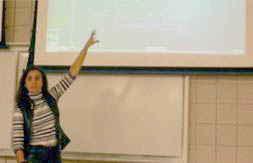
To learn more about these new ways of thinking about copyright and access to common culture, click on a subject at left or view the archived presentations from The University of Maine's November 2004
Conference on the Intellectual Commons.
ABOVE: Still Water Co-director Joline Blais presents The Pool at the Conference on the Intellectual Commons. Photo by Justin Russell.
Selected Overviews of Current Battlegrounds in Open Culture
Benkler,Yochai (2002). Coase's penguin, or linux and the nature
of the firm. [Electronic version].
The Yale Law Review. Retrieved
October 4, 2004, from
www.benkler.org/CoasesPenguin.html
Analyzes the emergence of commons-based peer-production in software
development, scientific research, and other cultural practices.
A profile of the University of Maine's efforts to
build an online environment for sharing art, code, and text.
Lessig, Lawrence (2004).
Free Culture: How Big Media Uses
Technology and the Law to Lock Down Culture and Control Creativity. [Electronic
versions]. Retrieved October 4, 2004, from
free-culture.org/freecontent/
Reshaping Scholarly Communication. Office of Scholarly Communication,
University of California. Retrieved October 4, 2004, from
osc.universityofcalifornia.edu/
Suber, Peter. (2004, September (last revised)). Open Access
Overview; Focusing on open access to peer-reviewed research articles
and their preprints. Retrieved October 4, 2004, from
www.earlham.edu/~peters/fos/overview.htm
Specially commissioned insights and analysis from leading scientists,
librarians, publishers and other stakeholders on the future of
access to the scientific literature.
Open Access Initiatives
Association of College & Research Libraries (ACRL) (2003). Principles
and Strategies for the Reform of Scholarly Communication, August
28, 2003. Retrieved October 4, 2004, from
makeashorterlink.com/?E2CB21279
The International Federation of Library Associations and Institutions
(IFLA). (2004). Statement on Open Access to Scholarly Literature
and Research Documentation, February 24, 2004. Retrieved October
4, 2004, from
www.ifla.org/V/cdoc/open-access04.html
Alternative Publishing Options and Experiments
arXiv
e-Print Archive. Cornnell University Library. Retrieved October
4, 2004 from
arxiv.org
Active archive for pre-prints, mainly in physics, mathematics
and computer science.
Alternative publishing option to create journals that will compete
with specific, highly priced journals.
A very innovative commercial service that makes refereed journals
freely accessible to the world.
An agreement by scholars not to publish in journals that do
not make their articles freely accessible within six months of
publication.
Selected Publications on Scholarly Communications
Crow, Raym (2002). The Case for Institutional Repositories.
Scholarly Publishing & Academic Resources Coalition. Retrieved
October 4, 2004 from
www.arl.org/sparc/IR/ir.html
Guédon, Jean-Claude (2001, October). Beyond Core Journals
and Licenses: The Paths to Reform Scientific Publishing.
ARL
Bimonthly Report 218. Retrieved October 4, 2004, from
www.arl.org/newsltr/218/guedon.html
Guédon, Jean-Claude (2001). In Oldenburg’s Long
Shadow: Librarians, Research Scientists, Publishers, and the
Control of Scientific Publishing. [Electronic version]. Retrieved
October 4, 2004, from
www.arl.org/arl/proceedings/138/guedon.html
Creative Commons
Committee on Licensing Geographic Data and Services. Board on
Earth Sciences and Resources (2004). Licensing Strategies and
Decisions. (pp 177-204). National Research Council of National
Academies Press. Retrieved October 4, 2004, from
www.nap.edu/books/0309092671/html/
Creativity and Open Culture
An online forum produced by Eyebeam and UMaine on legal innovations
for stimulating distributed creativity.
A consortium that aims to empower artists working in digital
formats by devising and promoting open standards for networked
art.
Scientific and Technical Data
National Research Council (2004). Open Access and the Public
Domain in Digital Data and Information for Science: Proceedings
of an International Conference. Retrieved October 5, 2004 from
www.nap.edu/books/0309091454/html/
National Research Council (2003). The Role of Scientific and
Technical Data and Information in the Public Domain: Proceedings
of a Symposium. Retrieved October 5, 2004, from
www.nap.edu/books/030908850X/html/
Onsrud, Harlan, Camara,G.,
Campbell, J. ,Chakravarthy, N.S. [2004,
July 5]. Public Commons of Geographic Data: Research and Development
Challenges. [Preprint of chapter in a forthcoming book]. Retrieved
October 4, 2004, from
www.spatial.maine.edu/geodatacommons/PubCommonsSNGL.pdf
Print
Print a
PDF or
HTML version of this bibliography.
The University of Maine has a history of innovation in intellectual property and scholarship. The University's forward-looking copyright policies, novel applications for stimulating online collaboration, and innovative approach to sharing knowledge have attracted attention from experts in open access and national press.
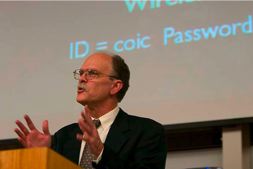
In founding the
Maine Intellectual Commons, the university is reaching out to include experts interested in broader initiatives that could affect a much larger community.
Find out more about past achievements by choosing a link at left.
ABOVE: Professor Harlan Onsrud presents University of Maine copyright innovations at the Conference on the Intellectual Commons. Photo by Bill Kuykendall.
In the late 1990s, the Faculty Senate at the University of Maine was instrumental in developing a policy for the entire University of Maine System that ensures that copyright clearly resides with creators and encourages those creators to place their works in the public domain or open access licensing environments.
The Maine Intellectual Commons group is working to build on this foundational work by refining the language of the original policy to match current legal standards. For more information, choose Work in Progress > Institutional Policy from the links at left.
Copyright, Scholarship, and the Case for Open Access:
A Conference on the Intellectual Commons
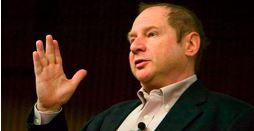
Saturday, Nov. 20, 2004
University of Maine, Orono
Learn new ways to stimulate and exploit open access to artworks and scholarly publications by reviewing the
archived presentations from this conference, which featured such speakers as
- Hal Abelson (MIT/Free Software Foundation)
- Jean-Claude Guedon (University of Montreal)
- Neeru Paharia (Creative Commons)
- Peter Suber (Public Knowledge/Scholarly Publishing and Academic Resources Coalition)
- Tim Whidden (MT Enterprises WorldWide).
ABOVE: MIT's Hal Abelson speaking at the Conference on the Intellectual Commons. Photo by Bill Kuykendall.
Working groups have been formed and are working on several suggested actions for the university community that arose from the conference and a follow-up meeting. The groups are largely exploratory and focused on proposal development at this point in time. Whether and how to pursue any recommended proposals arising from the working groups will be addressed in due course.
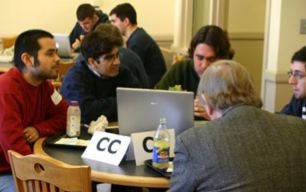
Documentation of materials under consideration by each working group is linked from each group as listed in the links at left. Discussions among and across groups are occurring on the Maine Commons Discussion List. You can browse or join this list via the
Join the Discussion link at left.
If you wish to join one or more specific working groups, please send a message to the chair as listed in each working group's description at left.
ABOVE: Open license workshops from the Conference on the Intellectual Conference. Photo by Bill Kuykendall.
The goal of this working group is to explore and propose one or more specific options for accomplishing the following:
- Clearly redefine the mission statements of the University of Maine and the University of Maine System to stress that our core institutional missions are to:
- advance knowledge and educate students in areas of scholarship that will best serve the nation and the world in the 21st century,
- commit our universities to generating, disseminating, and preserving knowledge, and
- work with others to bring this knowledge to bear on the world's great challenges.
Chair: James Campbell , campbell AT spatial.maine.edu
View the current deliberations on this topic.
Background Documents:
The current mission statement of the University of Maine may be found at
www.umaine.edu/mission.htm while a mission statement for the University of Maine System is not readily apparent.
The goal of this working group is to explore and propose one or more specific options for accomplishing the following:
- Create a library-based digital repository in support of the core missions for the creative scholarly output of faculty, researchers and students that provides expanded accessibility and long-term preservation.
Chair: Jim Bird (jim.bird AT umit.maine.edu) and Sharon Fitzgerald (sharon.fitzgerald AT umit.maine.edu)
View the current deliberations on this topic.
Background Documents:
The goal of this working group is to explore and propose one or more specific options for accomplishing the following:
- Create an institutional policy that ensures that copyright clearly resides with creators and encourages those creators to place their works in the public domain or open access licensing environments.
Chair: Harlan Onsrud , onsrud AT spatial.maine.edu
View the current deliberations on this topic.
Background Documents:
This task has been accomplished largely already for the University of Maine System. However, the current language needs minor changes.
University of Maine System Policy Manual, Section 209 Intellectual Property
www.maine.edu/policysc209.html
UMS Full Statement of Policy Governing Patents and Copyrights 2/22/02
"It is the policy of the University that all rights in Copyrightable Works shall remain with the author(s) and creator(s) unless: É" (narrowly proscribed exceptions) - most materials created in the normal course of teaching and scholarly work are presumed under the ownership control of the creator
The policy also encourages authors and creators to apply the University of Maine Broad Application Copyleft License (currently identical to "Design Science License")
The goal of this working group is to explore and propose one or more specific options for accomplishing the following:
- Change the reporting systems of the University of Maine System campuses to provide incentives for all scholars to make their works more globally available.
This might be done by systematically changing all applications for promotion and tenure and all applications for teaching, research, public service and other honorary awards so that:
- such applications must be submitted electronically, and
- application instructions should be revised to always ask for the active url where any listed journal article, conference article, advised thesis, teaching materials, and similar scholarly products may be openly read by any internal or external reviewer.
- Even stronger incentives might be imposed by the reporting system.
Chair: Jon Ippolito, jippolito AT maine.edu
View the current deliberations on this topic.
Background Documents:
Documents that might initially be considered for application of this principle on the University of Maine campus might include the following:
- Promotion and Tenure Application Format
(
www.umaine.edu/hr/relations/faculty/format05.htm)
- Alumni Association Distinguished Maine Professor Award
(Application available from Alumni Association)
- Presidential Outstanding Teaching Award
- Presidential Public Service Achievement Award
(Above two applications available on First Class)
- Presidential Research and Creative Achievement Award
- Regular Faculty Research Fund (PDF)
- Scholarly Materials and Equipment (PDF)
- Summer Faculty Research Fund (PDF)
(Above four applications at www.orsp.umesp.maine.edu/FacultyResearch.htm)
- IT Faculty Technology Stipends
(www.umaine.edu/fdc/application2003.htm)
- UMaine Recommended Course Syllabus Templates
Discussion:
Example: Please list your scholarly publications in each of the following categories. In providing the uniform resource locator (url) where the document may be read in full text, please provide a url where both internal and external reviewers may access the material.
- Peer Reviewed Journal Publications
- citation / url / journal citation index rating or acceptance rate of submissions
- Books
- citation / url
- Peer Reviewed Conference Proceedings (based on submission of full paper)
- citation / url / acceptance rate of submissions
- Other Conference Proceedings (based on peer review of abstracts)
- citation / url / acceptance rate of submissions
- Other Publications
- citation / url
Potentially go further: Scholarship available in a long-term archive that is openly available to the world is presumptively of greater value to society than those items failing to meet these criteria.
The goal of this working group is to explore and propose one or more specific options for accomplishing the following:
- Help professors and students to overcome publisher copyright release demands by providing an official university policy statement that may be attached and made a part of all submissions to publication outlets.
Chair: Marilyn Lutz , marilyn.lutz AT umit.maine.edu
View the current deliberations on this topic.
Background Documents:
SPARC and others have prepared sample statements that may serve as starting points.
The goal of this working group is to explore and propose one or more specific options for accomplishing the following:
- Help enable professors and researchers to make their works more globally available by providing a range of opportunities (short-courses, forums, workshops) within the normal offerings of the university that show those that need help how to create open access licenses and how to place articles, datasets, theses and teaching materials into long-term institutional or disciplinary depositories including the completion of cataloging information or metadata when appropriate.
- Alternatively, provide an open access licensing, cataloging and archiving service for the scholarly products of the university.
Chair: Burt Hatlen, burt.hatlen AT umit.maine.edu
View the current deliberations on this topic.
Background Documents:
Facilities already exist on campuses for aiding faculty in dealing with technology. By example, on the Orono campus, the Faculty Development Center and Fogler Library regularly offer short courses on learning how to accomplish specific software or data processing tasks.
The goal of this working group is to explore and propose one or more specific options for accomplishing the following:
- Educate the broad academic community on the benefits of pursuing a commons approach to the sharing, archiving and control of scholarly works.
Chair: Justin Hafford, justin AT umit.maine.edu
View the current deliberations on this topic.
Background Documents:
Maine Intellectual Commons members have written open letters in support of the 2006 Federal Research Public Access Act (FRPAA). More at the Maine Intellectual Commons
Maine Intellectual Commons Education Wiki..
The goal of this working group is to explore and propose one or more specific options for accomplishing the following:
- Craft a source license to stimulate digital creativity.
Chair: Jon Ippolito, jippolito AT maine.edu
View the current deliberations on this topic.
Background Documents:
UMaine's
Still Water group, has proposed this new license to Creative Commons and is in the process of drafting the legal framework as well as creating an inventory of sample applications accessible through the
Open Art Network.
An open e-mail discussion list has been established to facilitate the discussion of actions that might expand access to the scholarly materials produced by faculty, staff and students within the University of Maine System.
You may subscribe to the list at
lists.eogeo.org/mailman/listinfo/maine-commons.
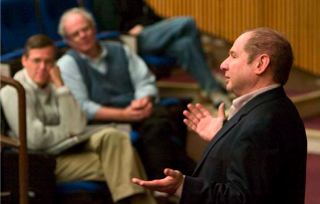
Once you are subscribed you will receive a confirmation message to which you must reply. After that you will receive email messages sent to the list by other subscribed members and you will be able to send mail to the list from your subscribed email address.
Please avoid using HTML formatted email when sending mail to the list. The list archives will "scrub" HTML formatting to prevent potential security problems with HTML content. Please also avoid sending attachments since not all subscribers, such as those in rural New England, are likely to have inexpensive or high-speed connections.
We hope this discussion list enables you to more actively engage with others in addressing the pressing issue of expanding access to the scholarly literature at a time when restrictive license terms and spiraling journal costs are reducing our campuses ability to provide students and faculty with the full range of scholarly materials they need for learning and research.
ABOVE: Allan Doyle, Jim Campbell, and Hal Abelson at the Conference on the Intellectual Conference. Photo by Bill Kuykendall.
The Steering Committee for the
Maine Intellectual Commons includes:
- Harlan Onsrud
- Marilyn Lutz
- Jon Ippolito
- James Campbell
Working Group chairs also include:
- Jim Bird
- Sharon Fitzgerald
- Burt Hatlen
- Justin Hafford
Institutional sponsors include:
and other organizations concerned with preserving and expanding access to digital information.
Web site by
Still Water.
To find out more about the Maine Intellectual Commons Initiative, please contact Jim Campbell:
campbell AT spatial.maine.edu
address and phone to come
Recent News











